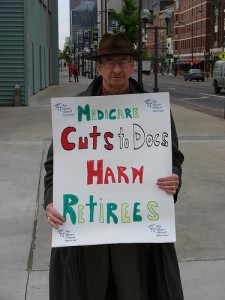November 17th was “White Coat Wednesday“, as declared by the American Medical Association (AMA).
“White Coat Wednesday” was the day chosen by the AMA for physicians to contact their state representatives to ask them to stop the proposed 23% cuts in medicare payments. Unless something was done, these cuts were slated to start December 1.
Thousands of calls were made, and the Senate tonight unanimously passed a bipartisan bill postponing the cut in Medicare reimbursement from December 1 to January 1. Before the house adjourned, a bill was proposed that would extend the effective date of Medicare cuts until the beginning of 2012.
That is good news for now, but we obviously need more fundamental improvements to fix a broken system and boost declining physcian morale.
Today I have been reading, In Their Own Words: 12,000 Physicians Reveal Their Thoughts on Medical Practice, in which physicians express their frustration and disappointment regrading the current state of medicine. This gem of a book, written by Phillip Miller of physician search firm Merritt Hawkins, and Lou Goodman and Tim Norbeck of The Physicians Foundation, came out of a large survey of physicians across the country. The survey gave doctors a chance to answer the question of how they feel about being physicians: What would they say if asked to speak directly to patients about medical practice in America today? The chapter, “Doctor For A Day”, does an excellent job of giving the non-physician a realistic understanding of what it is like to be a doctor in todays’ world. The authors let the physicians speak for themselves, providing ample statistics. Many directly relate to Medicare cuts, as well as hundreds of direct quotes from physicians sharing their 2 cents.
82% of the physicians said that their practices would not be sustainable if Medicare reimbursement is cut.
38% of the physicians would stop seeing Medicare patients altogether or reduce the number of Medicare patients they see.
36% of physicians said that Medicare reimbursement is less than the cost of providing care.
78% believed there is a shortage of primary care physicians in the United States.
60% said they would not recommend medicine as a career to a young person.
A selection of direct quotes: (over 4, 000 physicians wrote comments on the survey)
“I believe most primary care physicians are at the breaking point. There needs to be a grass roots effort to make everyone aware of this.”
“I put everything I have into treating my patients, but it’s too much work with too little in return. I am about to lose my family for nothing. My children have suffered because of time without their dad.”
“Can you imagine what would happen if your plumber handed you a bill for $60 and you replied, ‘I think I’ll just pay you $32?’ In no other profession are services paid for in such an arbitrary fashion. ”
“The current model is not working. Primary care doctors are tired of the continuous pay cuts, reimbursement games, and endless paperwork. As we spend less and less time with our patients because we have to fill out prior authorization forms for every third prescription we write, we become more distanced from the heart of it. There will be a serious healthcare crisis in this country when we walk away. ”
And a simple plea,
“Help”
There was no lack of candid expression from the physicians who shared their thoughts in this survey. However, it is often only through these types of surveys that doctor’s voices are heard. Doctors are not usually the ones sounding the horn about their struggles. Why the relative silence in the midst of significant challenges? A number of reasons come to mind:
- Doctors are too busy to do much else besides see patients and do paper work.
- Doctors in general do not like to complain, even to each other. It is seen as a sign of weakness.
- Accustomed to working independently, doctors don’t tend to form their own action groups or unite.
- Doctors expressing job dissatisfaction do not generally evoke sympathy from the public. There is a widespread perception that doctors are overpaid and have it easy compared to the rest of the working world.
Yes, it is true that being a physician has definite advantages, and many people are having a very hard time economically. However, the reality remains that if things do not change, there will continue to be a shortage of primary care physicians, with increasing numbers of physicians across the board leaving medicine prematurely. The sentiment among physicians I have spoken with is that the situation is going to get worse before it gets better.
Hopefully, that will not be the case. But regardless, this is a good time to give consideration to one’s practice and see how the picture looks for the long haul, if improvements are slow in coming. What would make the biggest difference for you? If you could change one thing, what would it be?
Latest Posts
Find what you're looking for:
Popular Categories:
Career Change | Career Enhancement | Job Search | Personal Development























